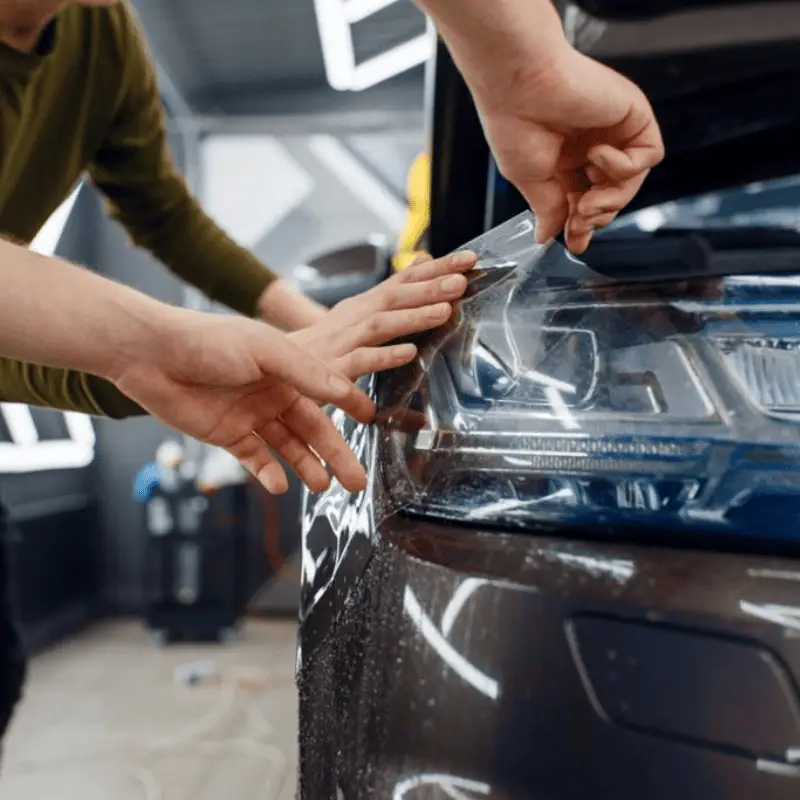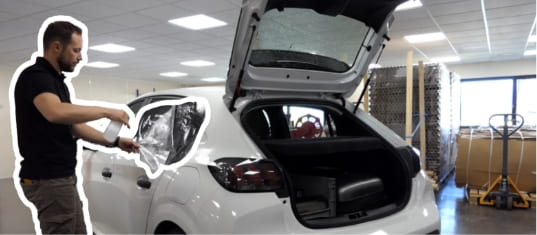
Le 12/11/2024
written by Laura P
The different laws on changing the appearance of a vehicle
The laws on changing the appearance of your vehicle
Want to change the look of your vehicle, but don't know if it's legal? Let's take a look at the different laws concerning wrapping, tinted windows, PPF film and headlamp film.

What does the law say about wrapping ?
Bring your bodywork back to life with the wrappinga simple and effective method for creating visual effects, changing color or imitating carbon. In an instant, completely transform your vehicle, whether it's a car, motorcycle or even a boat.
The wrapping Variance Auto are distinguished by their high quality, guaranteeing impeccable results. Suitable for all surfaces, whether flat or complex, they offer an alternative to paint, without the risk of damaging your bodywork.
In France, it's perfectly legal, but certain rules must be respected to comply with legislation. Here's what French law says about wrapping .
Prohibition on certain areas of the vehicle
- It is forbidden to install wrapping on the front windscreen and front side windows. However, it is possible to fit them on the rear-view mirrors, the bumper, therear of the body or the hood;
- The rear windows and windscreen can be covered, provided the vehicle is fitted with exterior mirrors on both sides.
Respect for safety features
The wrapping must not cover signal lights, indicators, rear lights, license plates, or mandatory manufacturer logos or markings;
If wrapping hides elements essential to the safety or identification of the vehicle, this may result in a refusal to pass the roadworthiness test, or in a fine during a roadside inspection.
Reflective films and imitations prohibited
- Reflective films or films imitating police,ambulance or other emergency service vehicles are strictly prohibited;
- The wrapping must not cause reflections that are annoying to other road users.
Unlike repainting your vehicle in a color different from the original, wrapping requires no administrative formalities, as the change is temporary.
In conclusion, it is perfectly legal to install a wrapping on your vehicle, but certain rules must be respected.

What does the law say about tinted windows?
Tinted windows for cars offer many advantages, including heat reduction, accident protection and reduced risk of break-in. In France, however, regulations are strict. That's why, before installing tinted windows, drivers like you must comply with specific rules to ensure safety and visibility.
Front and rear window regulations
Since Decree 2016-448 of 2016, the regulations on tinted windows have evolved. Here's what this law says:
- The light transmission rate (LTR) of front windows must be at least 70%. This means that the tint must not block more than 30% of the light entering;
- The rear side windows and rear window are not subject to the same restrictions. You can tint them as you wish, as long as you have functional exterior mirrors.
Tinted films that darken the front windows even more are prohibited. If you do not comply with this rule, you risk :
- A fine of €135.
- Withdrawal of 3 points from the driver's licence.
- Possible vehicle immobilization.
You must therefore take particular care when choosing the tint of your tinted window film to comply with standards.
Possible exemptions
Some people may be exempted from the rules concerning front windows for medical reasons (photophobia, for example). In such cases, a certificate issued by a specialist doctor is required.
In addition, public transport vehicles (ambulances, police cars) or diplomatic vehicles may also be exempt from these rules.

What does the law say about body protection film?
In France, body protection film, often called PPF(Paint Protection Film ), is legal and authorized. It enables you to preserve your vehicle's paintwork and bodywork. However, it must comply with certain rules to meet safety requirements and standards.
The film must not affect the visibility of the vehicle's signal elements, such as headlights, taillights or indicators. It is therefore forbidden to cover these parts with a protective film. What's more, the license plate must not be covered or obscured by the film, even partially.

What does the law say about lighthouse film?
As the name suggests,headlamp film is applied to the front and/or rear lights of your vehicle. Among the many advantages of headlamp film, its installation is regulated by law in France. Here's what you need to know.
Tinted or colored headlight films
Changing the original headlight color is strictly forbidden. The French Highway Code requires headlights to emit white or yellow light. The use of tinted headlamp films (e.g. black, blue, red) is therefore illegal, as it can alter the color of the light emitted. Headlights must remain visible and identifiable day and night. Any film that darkens the light is forbidden, as it can impair visibility and safety.
Transparent protective films
The application of a transparent protective film to protect headlamps against chips, scratches or impacts is permitted, provided that :
- The film must be approved and specially designed for use on headlamps;
- The film does not reduce light transmission. Headlamps must retain their lighting efficiency and comply with current standards;
- The film does not alter the color of the light emitted.
The use of headlamp films can result in failure of the roadworthiness test if the headlamps no longer meet the legal requirements for lighting and visibility.
Headlamps must be in good condition, with no opacity or light diffusion alteration. For this reason, a film that darkens or alters light diffusion will be considered a major defect.
Now you know all about the various laws and regulations concerning the redesign of your vehicle. You can now indulge yourself with one or more of our films.









